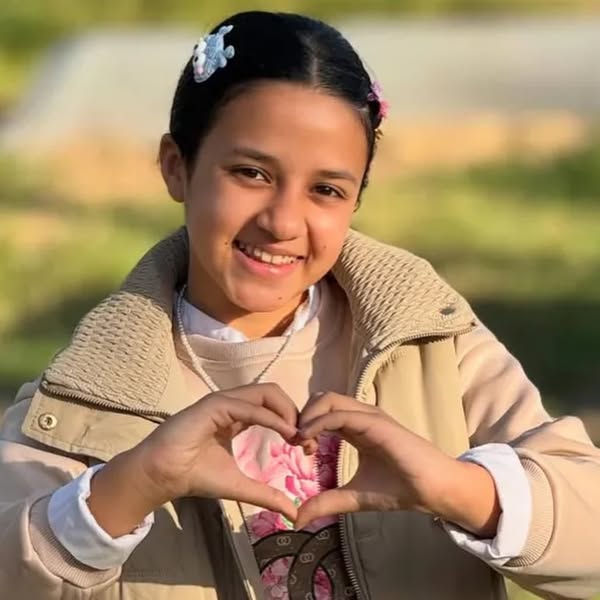The Brightest Light in Gaza Dimmed: Young Media Activist Yaqeen Hammad Killed in Airstrike
DEIR AL-BALAH, GAZA — On Friday night, the world lost one of its youngest and most luminous voices in the Gaza Strip. Yaqeen Hammad, just a child, was killed in an Israeli airstrike that struck her family’s home in Deir al-Balah. Her small body was recovered from beneath the rubble — silenced, but never forgotten.
Known affectionately across social media as “Gaza’s youngest media activist,” Yaqeen captured the world’s attention with a rare blend of innocence and courage. At an age when most children are shielded from the harshest parts of life, Yaqeen bore witness to relentless bombings, mass displacement, and the slow erasure of her homeland — and she documented it all.
Through videos she filmed and shared, she brought viewers face-to-face with the realities of war in Gaza. Sometimes she was surrounded by the smoke of destruction; other times, she appeared with a smile, handing out small gifts to children or talking about the joy of a sunrise. She projected light in a place increasingly consumed by darkness.
Her death is not only a tragedy — it is an indictment. One more name in a sea of names. One more child whose life was cut short before the world ever truly heard her voice. And for those who followed her story, her absence now looms large.
“I hope the beautiful face of Yaqeen Hammad haunts every single one of us for the rest of our lives,” wrote a social media user in a widely shared post. “She was Gaza’s youngest media activist… I hate that she felt the need to project joy in spite of so much, but also her nature was far above any of ours.”
Yaqeen’s story is emblematic of thousands in Gaza — children with dreams, families with hope, communities holding onto the last fragments of normalcy amid the rubble. Her story, though singular and heart-wrenching, is just one of tens of thousands since the conflict began.
A Voice Silenced, A Light That Should Have Lived On
Yaqeen was not trained as a journalist, but she had the heart of one. She chronicled her surroundings with a clarity that cut through propaganda and political spin. She humanized Gaza’s suffering not with sweeping statements, but with the quiet strength of everyday moments: playing with her siblings, distributing food, smiling through pain.
The footage she left behind serves as a digital memorial — and an urgent testimony to the international community.
As of this report, there has been no official response from Israeli officials regarding the specific airstrike that took her life. Deir al-Balah has been one of the many focal points of continued military operations in central Gaza in recent weeks, where strikes have reportedly hit residential areas under the justification of targeting militant activity. Civilian casualties continue to climb.
“They Really Do Not See Us as Human”
Yaqeen’s death has sparked another wave of global grief, particularly among those from war-torn regions who recognize the emotional burden of being simultaneously a victim and a witness.
“I think back to a feeling I had as a refugee of war here in the States in the 80s,” one person wrote. “They really do not see us as human. Outside of politics and news, they cannot imagine that we have hopes and dreams like they do.”
The pain of invisibility — of being reduced to numbers in war reports or overlooked in media narratives — compounds the physical suffering of those in Gaza. Yaqeen fought back against that invisibility with every frame she filmed, every post she made.
Calls for Accountability and Moral Reckoning
Grief has given way to growing anger and urgent calls for accountability. As images of Yaqeen’s smiling face circulate, many are demanding an end to what they describe as systemic dehumanization and unchecked violence.
Critics point to what they view as a failure of Israeli civil society to confront the policies of Prime Minister Benjamin Netanyahu and his government. While small anti-war protests have taken place in Israel, many feel that there is widespread complicity — or at least apathy — among the population.
“To think there are people in Israel not only unbothered but proud of the genocide? My god,” wrote one user. “These people are beyond dead… at least in Iran, we all push back against our government.”
Such comparisons draw attention to what some see as a lack of moral resistance in countries where citizens are free to protest but choose not to — a stark contrast to places like Iran, where mass dissent occurs despite violent crackdowns.
A Legacy That Demands More Than Mourning
For now, Yaqeen Hammad’s name joins a list that has grown unbearably long. She should have had a life filled with dreams, discovery, and childhood. Instead, she became a symbol of resilience far too early — and a victim of violence far too soon.
“I cry for hours about this most days. I don’t know what to do,” another post reads. “I just feel beyond hopeless… and yet I know none of us are allowed to give up on hope. Not while we sit in our relative comfort and pay for these massacres with our tax money.”
The international community, and every individual within it, must now decide what to do with the haunting legacy of Yaqeen Hammad. Mourning is not enough. Her life — her joy, her bravery, her death — demands action, justice, and above all, remembrance.
Let her face never be forgotten.
Let her story never be dismissed as just another casualty.
Let her light endure.

